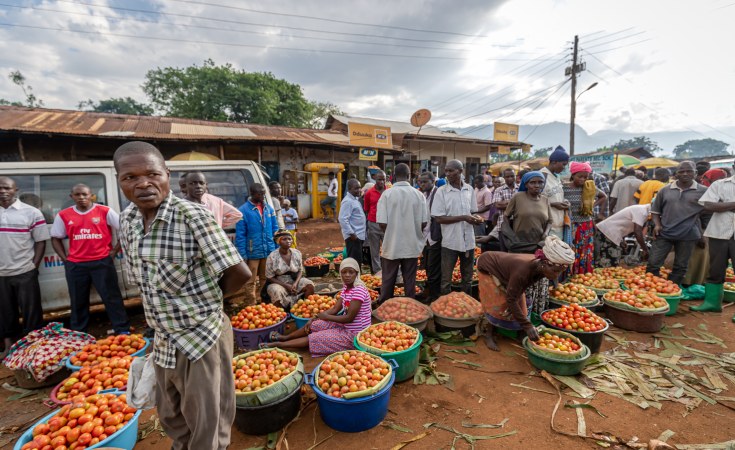Nigeria's major labor unions agreed to suspend a planned nationwide strike after talks with the government. DW looks at what led up to the planned action and how the situation could play out for workers and their unions.
A national strike planned for Tuesday across Nigeria was suspended for 30 days after last minute talks between labor unions and government officials.
When Nigerian President Bola Tinubu took office in May, he scrapped a fuel subsidy as part of his economic reforms -- but the measures sent fuel costs soaring and inflation is now at 25%, prompting the West African country's biggest labor unions to call for the indefinite strike.
What was agreed?
As part of its package with unions, the goverment offered a monthly 35,000 naira ($45, €43) short-term wage hike for public sector workers, a temporary suspension of value-added tax on diesel, and social security cash transfers to the poorest Nigerians.
The government proposals also included the introduction of gas-powered buses for public transport as a way to bring down transport costs -- one of the main gripes for people living in Nigeria.
A new minimum wage for all Nigerian workers is also expected to be agreed during the coming days.
"After 30 days if these issues are not implemented ... it will show bad faith on the side of government," Joe Ajaero, leader of the Nigeria Labour Congress (NLC), the country's largest federation, told reporters.
DW sources confirmed on Tuesday that workers from various public sector agencies returned to work as they acknowledged the strike's suspension.
"Nigerians are trooping to their offices," reported Ben Adam Shemang, DW's correspondent in Abuja, Nigeria. "They have resumed work and of course this has to do with the fact that labor and government have agreed."
Shemang explained that there is a high expectation among labor union leaders for the government to fulfil its promises to workers.
Can workers justify industrial action?
Some analysts told DW that workers' concerns were justified since the cost of living has skyrocketed this year.
"Everybody is aware of the hardship imposed on Nigerians as a result of the removal of petroleum subsidy," Francis Kozah, a Nigerian lawyer and social analyst based in Kaduna state, told DW. "The agitation of labor unions on the federal government to alleviate the sufferings of Nigeria is apt."
Ezekiel Uzochukwu, a management analyst based in Abuja, told DW that the government had not anticipated having to handle the negative impact of its economic reforms.
"The simple fact is that government needed to have done all their homework before now. They needed to have done all the calculations. They needed to have [checked] what the economy is, [and] what the citizens are passing through, what the civil servants are passing through, what the ordinary man is passing through before [rolling out the reforms]," Uzochukwu said.
But Kozah nonetheless praised the willingness of both the government and the unions to negotiate a way out of the crisis.
"The federal government's response to that attitude is also apt. It's also in context. So both of them are doing the right thing. At least the federal government [has] offered some palliatives to Nigerians and I think that is good," he said.
Nigerians endure harsh economic conditions
Africa's largest economy has been experiencing a worsening economic crisis for decades, dating back to well before before the current administration came to power.
The United Nations estimatedthat more than 60% of Nigerian citizens live in "multidimensional poverty."
And a recent World Bank report showed that as many as four in 10 Nigerians live below the national poverty line -- many of whom, especially in the country's north, lack education and access to basic infrastructure, such as electricity, safe drinking water and improved sanitation.
On Sunday, in a national broadcast marking 63 years of independence, Tinubu said that he is on course to turn things around.
"I am attuned to the hardships that have come. I wish today's difficulties did not exist. But we must endure if we are to reach the good side of our future," said Tinubu.
But many ordinary Nigerians expect more from their government.
"This year has been really bad for a lot of people - business-wise, business is not growing, nothing is moving, everything is just going down. The economy is crushing," a female resident of Lagos told DW.
For some citizens it is simply difficult making enough income for the needs of their families.
"The country is so hard, I am a bus driver, and I am being paid 45,000 [naira] a month, it is not even enough for me, [let alone] my children and my wife," the bus driver told DW.
Many Nigerians -- especially unemployed young people -- see no reason to be cheerful.
"You can celebrate a country when you know your country has done something for you -- when you look back and you can be proud of what your country has done for you," a young Nigerian in Lagos told DW.
Ben Shemang and Flourish Ubanyi contributed to this article
Edited by: Keith Walker
While you're here: Every weekday, we host AfricaLink, a podcast packed with news, politics, culture and more. You can listen and follow AfricaLink wherever you get your podcasts.


